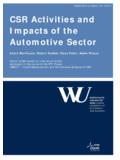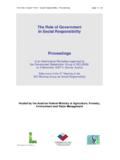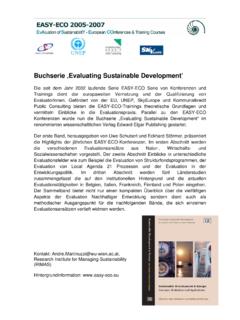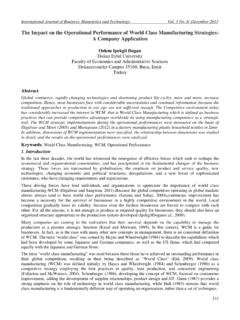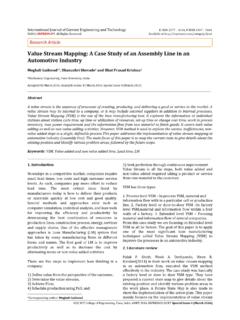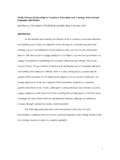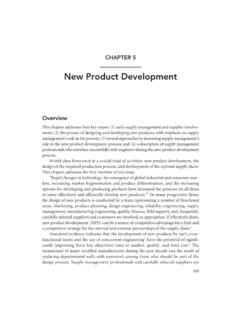Transcription of CSR Activities and Impacts of the Retail Sector - …
1 CSR Activities and Impacts of the Retail Sector Andr Martinuzzi, Robert Kudlak, Claus Faber, Adele Wiman Sector profile based on a literature review developed in the course of the FP7 Project impact - impact Measurement and Performance Analysis of CSR RIMAS Working Papers, No. 4/2011 Authors: Andr Martinuzzi Robert Kudlak Claus Faber Adele Wiman Keywords: literature review, Sector profile, Retail Sector , CSR, sustainable development, competitiveness, quality of jobs Contact: Research Institute for Managing Sustainability (RIMAS) Vienna University of Economics and Business Franz Klein Gasse 1, A-1190 Vienna, Austria Acknowledgements: The authors would like to thank Sonja Haasse, Katrin Lepuschitz and Daniela Wurnitsch for preparing valuable background information during this study and Megan Ahearn for proofreading.
2 RIMAS Working Papers aim at stimulating the scientific debate about Corporate Sustainability and Sustainable Development Policies. They are the outcome of ongoing research Activities at the Research Institute for Managing Sustainability at Vienna University of Economics and Business. They present preliminary results, which are open for debate and improvement for publication in scientific journals. All comments and suggestions are warmly welcome. The RIMAS Working Paper Series is edited by Andr Martinuzzi, head of the Research Institute for Managing Sustainability Visit for y More information about our projects y News and events y Downloads and publications y Registration for our newsletter y Getting in touch with us The Research Institute for Managing Sustainability at the Vienna University of Economics is a think-tank focusing on the areas of Sustainable Development and Corporate Social Responsibility.
3 Since its establishment around 10 years ago RIMAS has acquired Europe-wide recognition, having conducted projects within five different research fields for several EU Directorates General, as well as the EU Committee of Regions, European Statistical Office, UN Development Programme and a variety of national ministries. CSR Activities and Impacts of the Retail Sector 1 1. Abstract The Retail Sector accounts for one fifth of all non-financial business enterprises in the EU, generating EU value added and employing 17,5 million persons. The Sector is largely comprised of small and medium-sized enterprises. In Retail trade and repair, SMEs account for % of value added and % of employment. Some of the most important characteristics of the Retail Sector influencing competition in this market are maturity, overcapacity, high concentration, and price-driven marketing strategies.
4 Retailers are also struggling to build customers loyalty and repeat buying behaviour. These are significant success factors, as retaining customers is a much cheaper and more effective strategy than attracting new ones. As customers tend to prefer one-stop-shopping, format competition is also of great importance. Retailers are not as specialised anymore and usually offer a wide range of products to facilitate shopping. Recently, retailers have been showing much concern about on-line shopping, as it shrinks distances and timescale, lowers distribution and transaction costs, provides more information to buyers and sellers, and enlarges customer choice and reach (Ahlert et al., 2010). Location is a traditional success factor in the Retail Sector .
5 It has been proven that availability of store locations, next to capital requirements and availability of qualified personnel, was the major entry barrier in this Sector . The most important environmental issues in the Retail Sector include energy and water consumption, waste, the volume of packaging, land use, and transportation. Of great importance are also indirect Impacts such as the use of chemicals by suppliers ( farmers) and offering genetically modified food. The dominant issue for job quality is wages, which are up to 30% lower than comparable private services. This leads to high turnover and a large proportion of transitional workers and women working part time. Where national law allows, wage dumping is common. Consequently, job stability and security is also a high issue.
6 Paradoxically, this creates a double-edged sword, as many employees do not vitally depend on a particular job and employers struggle to remain staffed. Working hours tend to be irregular, uncontrollable, and inconvenient. This trend increases due to longer opening hours. Gender discrimination is a blind spot within the industry, with no significant dissatisfaction shown, but conditions actually discriminate against women, who tend to accept worse conditions in order to have less work-family life conflict. Part-time workers tend to be discriminated against full-time workers. Social dialogue varies nationally, but tends to be fragmented. Safety, ambient conditions, and intrinsic work quality are of no particular concern. 2 Martinuzzi / Kudlak / Faber / Wiman 2.
7 Facts and figures Retailing is generally described as the final stage of distribution from production to consumers (Eurostat, 2009). The Retail Sector accounts for one fifth of all non-financial business enterprises according to the latest available data ( mln enterprises; Eurostat, 2009), generating EU value added and employing 17,5mln persons - this is of the non-financial business economy. The Sector is largely comprised of small and medium-sized enterprises. In Retail trade and repair, SMEs account for of value added and of employment (Eurostat, 2009). However, a few of the largest retailers, such as Tesco, Lidl, Sainsbury s, and Asda, are constituting the rules of the game in the Sector . The largest subsector in Retail is specialised Retail at least half of the total Retail trade turnover is generated in specialised Retail stores.
8 Contrary to that, food Retail is mostly non-specialized in all Member States. Table 1 below indicates that only value added has been created by specialised food retailers (Eurostat, 2009). NACE: Retail Trade and Repair Division 52 Share of Sector employment (2005) Share of Sector value added (2006) NACE Group Non-Specialised in-store retailing (Class food beverages and tobacco predominating and Class non-food predominating) NACE Group Specialised in-store food retailing NACE Group Specialised in-store new goods retailing other than food (pharmaceutical and medical goods, cosmetic and toilet articles) NACE Group Specialised in-store new goods retailing other than food (Other Retail sale of new goods in specialized stores)
9 NACE Group Retail sale of second-hand goods in stores NACE Group Retail not in stores NACE Group Repair of personal and household goods Table 1: Retail subsectors (NACE: Retail Trade and Repair Division 52 ) Source: Eurostat 2009 As the table above indicates, specialised retailing (other than food: NACE and ) all together represent the biggest share of EU value added and employment, and are often accounted as one. However, if these sub-sectors are considered separately, then the non-specialised retailing in supermarkets and hypermarkets is the biggest in terms of both value added and employment (Eurostat, 2009). Figure 1 illustrates that non-specialised retailing is predominant in all EU Member states in terms of the share of generated turnover.
10 CSR Activities and Impacts of the Retail Sector 3 Figure 1: In-store food retailing breakdown in turnover by country. Source: Eurostat 2009 Table 2 below shows the top five Member states that generate the highest EU value added in the Retail Sector . No. Country Value added 1. United Kingdom 2. Germany 3. France 4. Italy 5. Spain Table 2: Highest value added countries Source: Eurostat 2009 European retailers are amongst the most internationally active of all global regions, on average operating in countries. For example, German and French retailers generate approximately 40% of their turnover in foreign operations. Deloitte (2010) also reports that Food has been a dominant focus among the top 250 world retailers. Sector employment: Between 1998 and 2007, employment in Retail trade has been moderately rising at a rate of per annum.
